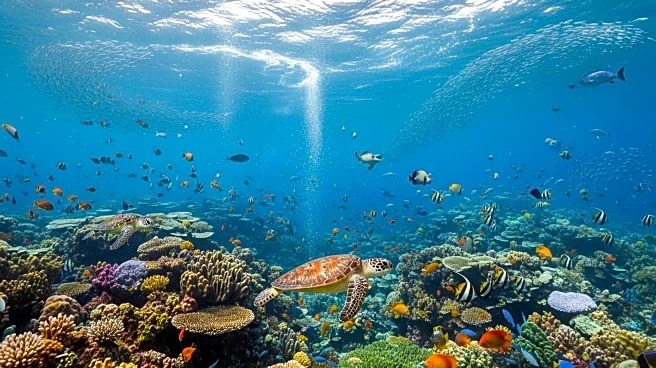What's Happening?
The Smithsonian Tropical Research Institute (STRI) has reported a significant disruption in the seasonal upwelling process in the Gulf of Panama, which did not occur for the first time in 40 years. This upwelling, typically occurring from January to April, is crucial for bringing cold, nutrient-rich waters to the surface, supporting productive fisheries and protecting coral reefs from thermal stress. The absence of this process in 2025 has led to reduced temperature drops and decreased productivity in the region. Researchers attribute this unprecedented event to a significant reduction in wind patterns, highlighting the impact of climate disruption on essential oceanographic processes. The findings, published in the journal PNAS, emphasize the need for further research to understand the precise causes and potential consequences for local fisheries.
Why It's Important?
The disruption of the upwelling process in the Gulf of Panama has significant implications for the region's ecological and socioeconomic systems. Upwelling supports highly productive fisheries, which are vital for the livelihoods of coastal communities. The absence of this process could lead to reduced fish stocks, impacting food security and economic stability in the region. Additionally, the lack of upwelling may increase thermal stress on coral reefs, threatening biodiversity and the health of marine ecosystems. This event underscores the vulnerability of tropical upwelling systems to climate change and the urgent need to enhance ocean-climate observation and prediction capabilities to mitigate potential impacts on fisheries and coastal communities.
What's Next?
Further research is necessary to determine the precise causes of the disruption in Panama's upwelling process and its long-term implications. Scientists are likely to focus on understanding the changes in wind patterns and their connection to broader climate disruptions. Strengthening ocean-climate observation systems in tropical regions will be crucial to predict and manage future disruptions. Policymakers and stakeholders in the fishing industry may need to develop adaptive strategies to cope with potential changes in fishery productivity and ensure the sustainability of coastal communities reliant on these resources.
Beyond the Headlines
The disruption of Panama's upwelling process highlights broader concerns about the resilience of oceanographic systems in the face of climate change. It raises questions about the capacity of current monitoring systems to detect and respond to rapid environmental changes. The event also points to the need for international collaboration in research and policy-making to address the challenges posed by climate change to marine ecosystems and the communities that depend on them.











